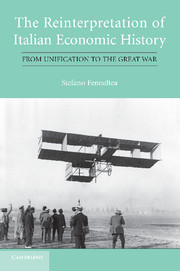Book contents
- Frontmatter
- Contents
- List of Tables
- List of Figures
- Acknowledgments
- Preface
- Introduction
- 1 The Time Series and the Interpretations
- 1A The Measurement of Production Movements
- 2 The Investment Cycle
- 3 The Consumption Cycle and the “Crisis” of the 1880s
- 4 Protection and Migration
- 5 Railways
- 6 North and South
- 6A North and South: A Sectoral Analysis
- 7 The State of Play
- APPENDICES: TARIFFS, TRADE, MIGRATION, AND GROWTH
- References
- Index
5 - Railways
Published online by Cambridge University Press: 05 March 2012
- Frontmatter
- Contents
- List of Tables
- List of Figures
- Acknowledgments
- Preface
- Introduction
- 1 The Time Series and the Interpretations
- 1A The Measurement of Production Movements
- 2 The Investment Cycle
- 3 The Consumption Cycle and the “Crisis” of the 1880s
- 4 Protection and Migration
- 5 Railways
- 6 North and South
- 6A North and South: A Sectoral Analysis
- 7 The State of Play
- APPENDICES: TARIFFS, TRADE, MIGRATION, AND GROWTH
- References
- Index
Summary
The railway in history and in the literature
Transport costs determine the location of economic activity. Relatively immobile resources attract the relatively mobile, low-value goods high-value goods: man lives next to water, even in prehistory salt was traded over great distances.
Traditional technologies allowed relatively low transport costs only on water, on safe rivers or seas. On land, even on the sea if the cargo had to be defended, only the highest-value goods could bear the cost of long-distance transportation; low-value goods were limited to short distances, to local trade. An inland city not on a navigable waterway was nourished by the nearby countryside, and the short distances over which low-value goods could be moved set a limit to the city's size; over the centuries transportation technology barely changed, and Europe's cities did not grow beyond their medieval walls.
The resistance to movement is reduced if the road is improved. Investment in such improvement is particularly profitable where traffic is not only heavy but homogeneous, for with standard vehicles, of invariant gauge, the road itself can be reduced to two parallel strips: wooden tracks were laid down at the mines, to increase the hauling power of the draft animals.
In eighteenth-century England the iron industry rapidly improved its methods, much reducing the cost of castings, of wrought iron bars and plate. Iron tracks were laid down to serve general traffic, with horsedrawn cars and carriages: the common-carrier railway was born.
- Type
- Chapter
- Information
- The Reinterpretation of Italian Economic HistoryFrom Unification to the Great War, pp. 167 - 190Publisher: Cambridge University PressPrint publication year: 2011



